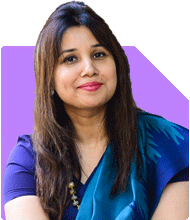Archana Deshpande | Answer |Ask -Follow
Image Coach, Soft Skills Trainer - Answered on Mar 21, 2024
She has been working with individuals and corporate organisations for more than 10 years during which she has helped professionals and students improve their soft skills, build confidence and enhance self-esteem.
An engineer from the PDA College of Engineering, Gulbarga, Archana had a successful career at Reliance Communications. But she has always been interested in teaching and training people. So she pursued a postgraduate diploma in teacher’s training at Pune’s Symbiosis Institute of Management Studies followed by teaching assignments in schools at Visakhapatnam and Mumbai.
Archana also holds an international certificate in image consulting and soft skills training from the Image Consulting Business Institute, Mumbai.... more

My son who is 9 is afraid of Maths. How do i convince him to come out of the fear. He is also anxious to go in public, starts crying over small discussion on study. Please help. how can i help him.
You may like to see similar questions and answers below
Mayank Chandel |2562 Answers |Ask -Follow
IIT-JEE, NEET-UG, SAT, CLAT, CA, CS Exam Expert - Answered on Mar 16, 2023
Aruna Agarwal | Answer |Ask -Follow
Child and Parenting Counsellor - Answered on Jul 10, 2023
Archana Deshpande | Answer |Ask -Follow
Image Coach, Soft Skills Trainer - Answered on Mar 21, 2024
Dr Dipankar Dutta |1837 Answers |Ask -Follow
Tech Careers and Skill Development Expert - Answered on Dec 05, 2025
Dr Shyam Jamalabad |108 Answers |Ask -Follow
Dentist - Answered on Dec 05, 2025
Dr Shyam Jamalabad |108 Answers |Ask -Follow
Dentist - Answered on Dec 05, 2025
Dr Shyam Jamalabad |108 Answers |Ask -Follow
Dentist - Answered on Dec 05, 2025
Dr Dipankar Dutta |1837 Answers |Ask -Follow
Tech Careers and Skill Development Expert - Answered on Dec 05, 2025
Ulhas Joshi |280 Answers |Ask -Follow
Mutual Fund Expert - Answered on Dec 05, 2025
Dr Dipankar Dutta |1837 Answers |Ask -Follow
Tech Careers and Skill Development Expert - Answered on Dec 04, 2025
Ravi Mittal |676 Answers |Ask -Follow
Dating, Relationships Expert - Answered on Dec 04, 2025
Anu Krishna |1745 Answers |Ask -Follow
Relationships Expert, Mind Coach - Answered on Dec 04, 2025
Anu Krishna |1745 Answers |Ask -Follow
Relationships Expert, Mind Coach - Answered on Dec 04, 2025


























